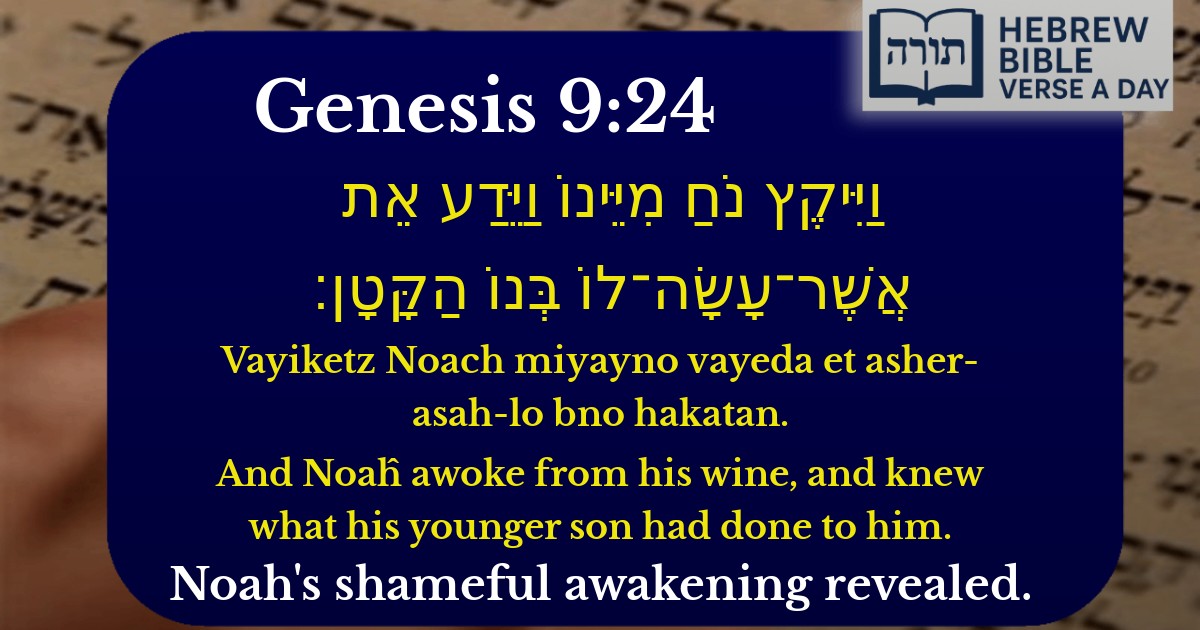Join Our Newsletter To Be Informed When New Videos Are Posted
Join the thousands of fellow Studends who rely on our videos to learn how to read the bible in Hebrew for free!
Hebrew Text
וַיִּיקֶץ נֹחַ מִיֵּינוֹ וַיֵּדַע אֵת אֲשֶׁר־עָשָׂה־לוֹ בְּנוֹ הַקָּטָן׃
English Translation
And Noaĥ awoke from his wine, and knew what his younger son had done to him.
Transliteration
Vayiketz Noach miyayno vayeda et asher-asah-lo bno hakatan.
Hebrew Leining Text
וַיִּ֥יקֶץ נֹ֖חַ מִיֵּינ֑וֹ וַיֵּ֕דַע אֵ֛ת אֲשֶׁר־עָ֥שָׂה ל֖וֹ בְּנ֥וֹ הַקָּטָֽן׃
וַיִּ֥יקֶץ נֹ֖חַ מִיֵּינ֑וֹ וַיֵּ֕דַע אֵ֛ת אֲשֶׁר־עָ֥שָׂה ל֖וֹ בְּנ֥וֹ הַקָּטָֽן׃
🎵 Listen to leining
Parasha Commentary
📚 Talmud Citations
This verse is quoted in the Talmud.
📖 Sanhedrin 70a
The verse is discussed in the context of Noah's awakening from his wine and the actions of his son Ham, exploring the implications and interpretations of the incident.


Understanding the Verse in Context
The verse (Bereshit 9:24) describes Noaḥ awakening from his wine and realizing what his youngest son, Ḥam, had done to him. This follows the incident where Ḥam saw his father's nakedness and told his brothers, Shem and Yefet, who then covered Noaḥ with a garment (Bereshit 9:20-23). The Torah does not explicitly state what Ḥam did, leading to various interpretations among the commentators.
Rashi's Explanation
Rashi (Bereshit 9:24) cites the Midrash (Bereshit Rabbah 36:7) which explains that Ḥam either castrated Noaḥ or engaged in an act of sexual impropriety. The Midrash derives this from the phrase "אֲשֶׁר־עָשָׂה־לוֹ" ("what he had done to him"), implying a severe violation. Rashi further notes that Ḥam prevented Noaḥ from having a fourth son, which is why Noaḥ later cursed Ḥam's son, Canaan (Bereshit 9:25), as retribution for this act.
Ramban's Perspective
Ramban (Bereshit 9:22) offers a different interpretation, suggesting that Ḥam's sin was not physical harm but a lack of respect for his father. By seeing Noaḥ's nakedness and publicizing it rather than covering him, Ḥam displayed contempt for his father's dignity. Ramban emphasizes that Ḥam's failure to act with reverence was the primary transgression.
Ibn Ezra's View
Ibn Ezra (Bereshit 9:22) takes a more literal approach, stating that Ḥam's sin was simply seeing his father's nakedness and mocking him, rather than covering him as his brothers did. He argues that the Torah does not specify a more severe act, and the curse on Canaan was due to Ḥam's disrespectful behavior.
Midrashic Interpretations
Halakhic Implications
The Gemara (Sanhedrin 70a) discusses the severity of disrespecting parents, linking Ḥam's actions to the broader principle of honoring one's father and mother. The incident serves as a warning against dishonoring parents, a foundational mitzvah in Torah.
Lessons from the Verse